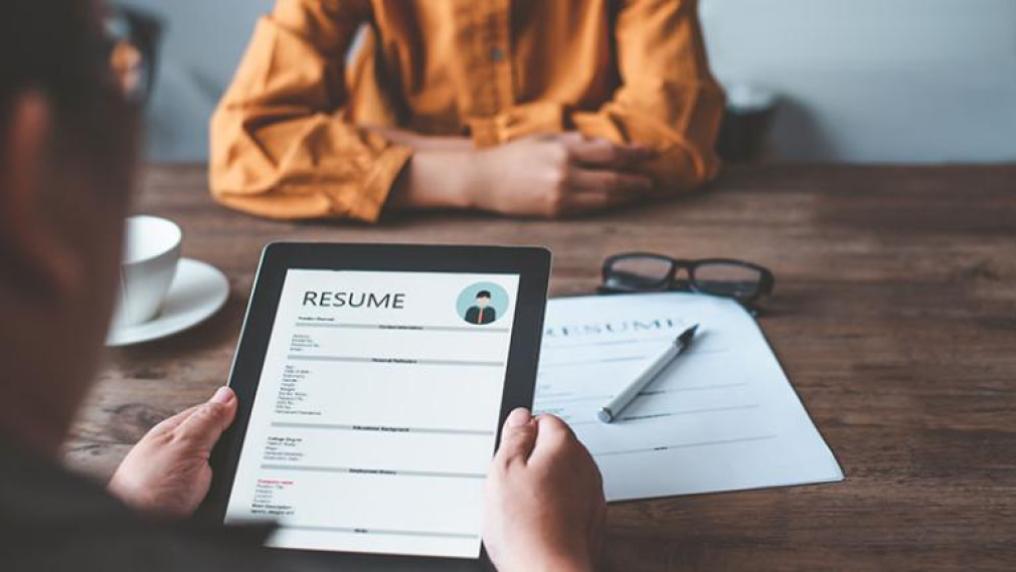How to prepare for your first job interview & land the role of your dreams
Sharpen your interview skills
Let’s face it, no matter how long you’ve been in the game, the job interview process is daunting. It can turn even the calmest of people into a hot mess.
And this is especially true for your first professional role. When you’re launching your career and are very new to the hiring process, interviewing can be overwhelming.
These tips will help you nail your next job interview. Follow our checklist for interview success!

Our tips for job interview success
1. Research the company
Find out everything you can – about the company, the position, the industry, and even the person hiring you. Study the businesses' core values and decide whether they align with your own.
LinkedIn is a great resource to tap into. Make sure your profile is polished and up to date.
Speaking of social media, go through your Facebook and Instagram, and either switch your profiles to private, or review your history with a seriously critical eye. Many employers will do their research too on prospective candidates, and you don’t want to have anything on your platforms that reflects badly on you.
2. Study the job criteria
You’ll have read the position description when you first applied for the role, but make sure you’re completely across the required skills ahead of the interview.
See how you can frame your experience to demonstrate what you can contribute to the job. as youre preparing for your first professional job interview and may only have your education to reference, look to your experiences during collaborative projects, volunteer work, internships – even after school or university jobs.
You may have more experience up your sleeve than you initially believe!
Research any skill or criteria you’re unfamiliar with, so you have a ready answer if it comes up in the interview. Learn how to highlight your strengths, as well as any challenges you believe you may face – it may be helpful to instead reframe them as learning opportunities.
This will help build your confidence – you’ll feel way more prepared when it comes to time to interview for your first professional job.
3. Practise answering questions
Many companies use the STAR method when interviewing potential employees. Don’t be concerned – it’s merely a tool to help you create an easy-to-follow answer, following a clear process to reach a resolution.
The acronym STAR stands for:
- Situation: set the scene of your example.
- Task: describe your responsibility in this situation.
- Action: detail the steps you took to solve the problem.
- Result: share the outcomes you achieved through your actions.
This method is a great interview skill to have, as it will help you answer any question where you need to tell a story.
And how do you know what these questions are? Here's a hint – an interviewer will start any such question with:
- “Tell us about a situation where…”
- “Give us an example of…”
- “What do you do when…”
As part of your preparation, set yourself a few interview questions and practise your answers. If you don’t get asked these specific questions in your interview, it’s not wasted time – you’ll have familiarised yourself with the method and can use it as needed for future interviews.
4. Calm your nerves
Sometimes nerves can distract you from your best performance. To help calm them, arrive early, visit the bathroom, find a seat, and take a few deep breaths.
Bring water to sip slowly – this will help reduce your heart rate.
If you’re interviewing over video call, make sure you set everything up in advance. Log into Microsoft Teams or Zoom, and test your video and microphone, to troubleshoot any potential tech failures.
During the interview itself, try not to fidget, and if you lose concentration or you don’t understand a question, politely ask the interviewer to repeat it.
If you’re halfway through an answer and you’ve lost the thread of where you were heading, don’t panic or get flustered. Stop to give yourself a moment, take a deep breath and ask if you can start again.
You also don’t have to launch straight into an answer. It’s fine to take a moment to consider the question and how you’ll respond. It’s a sign of respect that you’re trying to understand what is required of you. The interviewers asked you here because they want to meet you and are interested in what you have to offer – remember that!
Feeling nervous? Practise!
Try having a mock interview with a friend or family member. Search online for common interview questions that they can ask you.
Repetition will help cement certain answers in your head, which you can reach for when it comes to the real deal.
5. Make the best first impression
A first impression is made in 30 seconds. Give yourself the best chance by looking sharp and smelling good. Remember that a dousing of cologne or perfume can be just as offensive and distracting as body odour, so don’t overdo it!
You want to be the sleekest dressed person there when you arrive. Use people’s names if you know them and always thank them for the opportunity to interview. A firm handshake also goes a long way.
If you can, check out the workplace a few days before and get a sense of their style (and learn exactly how long it takes to get there).
Interviewing over Zoom or on the phone? Consider the setting. Pick a quiet room with no clutter and nothing distracting in the background.
If you live with housemates or family, let them know when your interview is, so there will be no random noise disturbances. You can politely ask them to time any errands, appointments or coffee runs with your interview, to minimise distraction.
And make sure you look just as presentable over video as you would in person – from tip to toe!
6. Never say never
When you’re asked a question and you don’t know the answer, try to avoid saying, ‘I don’t know’. Respond instead with a comparable experience or skill you have, which in turn, is a really effective interview skill.
It’s also okay to not have a particular skillset, particularly when you're just starting out in your career. Avoid answering with ‘no, I don’t have that skill'. Instead, you could say: 'I'm interested in finding out more about [skill]. I understand that’s something your company does well, and I’d be keen to become proficient in it’.
If you’ve researched the role, you’ll know if you don’t completely meet the criteria, so think about what steps you could take get there. Remember that you’re getting interviewed regardless of any gaps in your skillset, so you must have something they like!
7. Know your worth
Make sure you know your worth – and the worth of the job – before you set foot in, or log into that interview room.
Not all salaries are displayed in job adverts and it’s perfectly acceptable to ask about earnings during your first job interview. You could tactfully inquire about the remuneration package, including superannuation – it’s a more subtle way to ask.
If this is a great career-boosting opportunity and you’re just starting out, the importance of gaining experience will outweigh any pay packet. Though we’re not saying work below minimum wage – unless it's a short-term, unpaid internship, that will set you up well for future career prospects.
Research industry pay standards – you can do this with online resources like PayScale. If you accept the job and pass the probationary period, you may have another opportunity to discuss salary.
8. Strengthen your weaknesses
Many employers will ask about your weaknesses to observe your more honest side – and see how you handle a difficult question.
Never tell an interviewer that you’re bad at something. And avoid answering with an attribute that the job requires. If it’s a project management job, don’t say you’re disorganised or struggle to meet deadlines (even if that’s true!).
As you prepare for your first job interview, you can write down three areas you believe you can improve in. Then, if an interviewer asks you what your weaknesses are, you can frame your greatest challenge positively.
Some answers you could consider include:
- ‘I have difficulty saying ‘no’ to others sometimes’
- ‘I focus too much on the details’
- ‘I can have trouble asking for help’.
Make sure you:
- think hard about your weaknesses and name one that is truthful – be sincere!
- don’t share a weakness that is irrelevant to the job
- share any insight you’ve gained as part of your growth.
An important part of your answer should be demonstrating self-improvement. You should include details about the steps you’re taking to learn a skill or correct a weakness.
For example, instead of saying you’re disorganised, say you sometimes have a hard time delegating tasks, so you take on more than you should. But you’re getting coaching to work on your assertiveness and develop mutual trust in colleagues, to ensure everyone does their fair share of work.
9. Compile a list of questions to ask the interviewers
Remember – an interview is a two-way process. Not only are the interviewers there to find out if you’re the best person for the job – you’ll want to know if the company is a good fit for you.
Some questions you could ask include:
- What do you like best about working for this company?
- Can you provide a few examples of challenges an employee may face in this role?
- How do you measure success in this position?
Asking questions shows you’ve done your research and fully prepared for your first job interview. Plus, chances are, you’ll be asked if you have any questions at some point – you don’t want to be thrown off guard!
10. Leave a good impression
The last impression interviewers have of you is almost as important as the first – as it’s likely to be remembered. Make sure you thank each of them for your time.
You might also ask what the next steps of the hiring process are. There may be further interviews or tasks to complete.
At the very least, it’ll give you a timeframe for when you’ll hear back from the company.
11. Send a thank you email
Within the next 48 hours, send a thank you email to each person you interviewed with.
If you don’t have their email and were unable to obtain a business card, at least thank the hiring manager for the opportunity.
This will reflect well on you, and show you care about getting hired.

In conclusion: Preparing for your first job interview
Interviews can be nerve-racking, especially when it’s for your first professional job. Having an interview checklist can help you plan and prepare. Then, you can step or log into the room with confidence, ready to sell your best self.
Just graduated or still studying & need career support?
VU's Learning Hub online offers recent graduates and current students career advice and academic support. You'll gain access to the online jobs board, career resources, virtual interview practice, drop-in sessions, workshops and mentoring.
Recently graduated? Keep in touch and check out the benefits just for you, thanks to the VU Alumni Association.